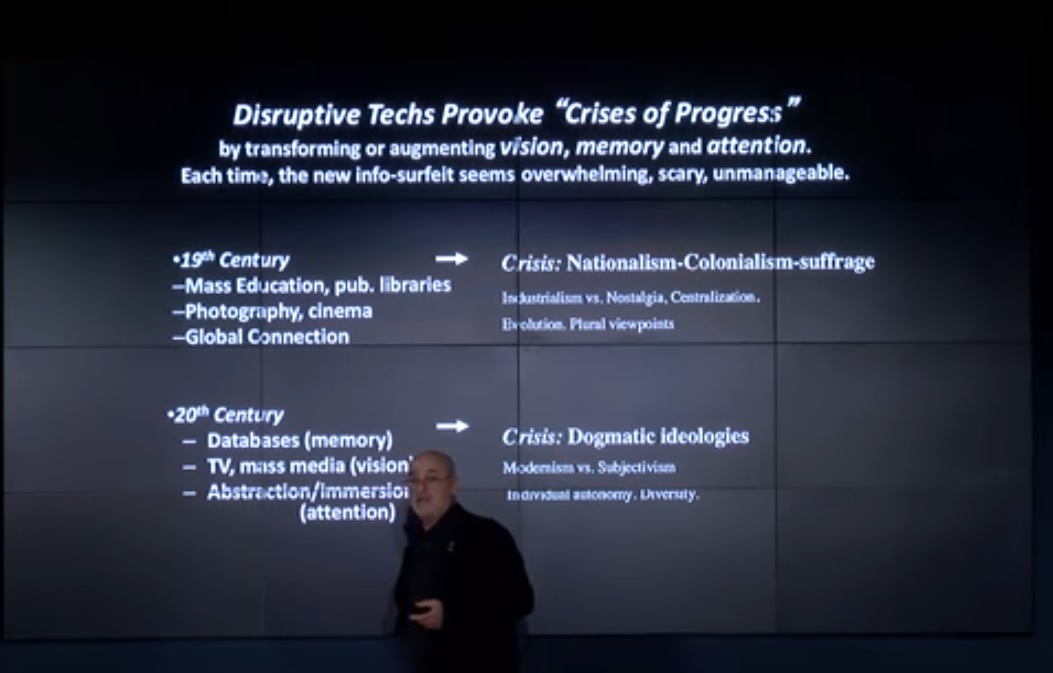We’ve often heard from Prime Minister Malcolm Turnbull some variation of the present being “the most exciting time in human history”, where “the pace and velocity of change and the opportunities so presented are literally without precedent.”
This is, of course, not quite true.
“For 500 years we’ve had revolutions that were driven by technology,” science fiction author and futurist David Brin told IBM’s World of Watson conference.
“Each generation has had these expansions of what you can see, what you can know, what you can pay attention to, what you can reach.”
Glass lens’ were an expansion of what humans could see, Brin said. Movable type was an expansion of what people could know and remember.
“All of a sudden you had ‘external prosthetics’ outside your skull where you could store lots and lots of memory,” he said. Later, we would see the advent of photography and cinema, of global connectivity, mass media and immersive technology.
Two things happened each time there was progress.
Firstly, the world was divided into groups of people that were either optimistic or pessimistic of the technology’s potential.
“Every single time grouches said human beings weren’t made by God or evolution to be able to drink from this firehose,” said Brin.
“The normal people are not going to be able to handle this, we need elites to intermediate because they’ll go crazy.
“And always there were transcendentalists and optimists who said this is going to make everybody better. It’s going to expand their notion of who’s out there; we’re going to be including more types of people.
“And always in the short term it was the grouches who were right. The printing press did not expand empathy at first, but over time books spread, and people expanded their notion of inclusion and who they were.”
The second thing that happened at each stage of progress was that it resulted in some form of crisis – religious upheaval, industrialisation, and the promotion of dogmatic ideologies, to name but a few.
Progress continues to occur. The pace – arguably – is quickening, but in some ways what we are seeing is nothing new, and simply a repeat of the pattern of progress and crisis that has accompanied the past 500 years.
Progression towards what some call the fourth industrial revolution could result in a jobs crisis or a range of new opportunities that have yet to even be dreamed of.
Artificial intelligence could create incredible augmentation of human capabilities, or it could usher in the singularity where the world becomes so powerful we can’t understand it.
Even more immediate advances in handheld technology are forcing children to “face and overcome new kinds of addiction”, Brin noted.
“So the question is, will the grouches be right now, that it’s not a firehose [of progress] - it’s a tsunami.
“We will expand ourselves with prosthetics of vision, memory and attention just as we’ve been doing since the printing press and the glass lens, only these won’t be expansions or multiplications – they’ll be exponentiations.”
Where Turnbull’s “most exciting time” phraseology is likely to ring truest is in artificial intelligence.
“To our knowledge, intelligence has happened only once in the universe,” Brin said.
“We’re [now] in the process of exploring the possibility that we might engender more. And so will we all be united in our celebration of the achievement of AI or will we be cautiously teaching our children how to behave?”
Brin believes that with the work being undertaken now, “we are changing ourselves”.
“This is a Michael Crichton fear,” he said.
However, he doesn’t necessarily see it as a reason to halt progress, just adjust how it moves forward.
“The answer to every single Michael Crichton novel and movie, by the way, is that the innovation was done in secret,” said Brin.
“In every single Michael Crichton story, the lesson is not don’t do it, but do it out in the open where it can be criticised.”









